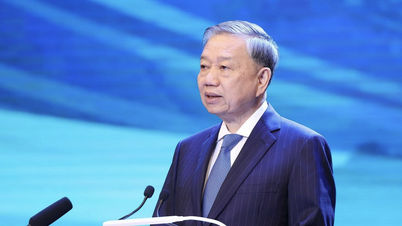 |
The new point in the draft Law is to prioritize the development of the semiconductor industry, artificial intelligence (AI) and digital assets. Photo: Adobe Stock . |
The digital technology industry has been identified by the Party Central Committee as one of the strategic foundations of the national digital transformation revolution.
By 2024, the industry is expected to reach a total revenue of 152 billion USD , an increase of 35.7% compared to 2019. Of which, Vietnam's contribution accounts for 31.8%, a significant increase compared to 21.35% in 2019. The total number of employees in the industry is 1.67 million, an increase of 67% compared to 2019, with 54,500 operating enterprises.
Vietnam currently has 5 top digital technology industrial products in the world , including exports of smartphones, computer components, computer equipment, electronic components and software outsourcing.
Therefore, on November 30, the National Assembly discussed the draft Law on Digital Technology Industry (Law CNCNS) at the 8th session, 15th tenure. This law will support the construction of a digital economy and digital society, promoting the development of Vietnamese digital technology enterprises through regulations on research, development, infrastructure construction, technical standards and human resource training.
The new point in the draft Law is to prioritize the development of the semiconductor industry, artificial intelligence (AI) and digital assets. Regarding the semiconductor industry, this is a strategic field with the ability to strongly impact other technology industries.
Instead of using the term “semiconductor microchip” as before, the draft has expanded it to “semiconductor industry” to ensure comprehensiveness and consistency with the industry’s comprehensive development strategy. The Government will develop specific policies to promote this sector in each stage.
In addition, artificial intelligence is also considered a core technology and is emphasized in the draft law. The principles of AI development include transparency, accountability, non-discrimination, privacy protection, and promoting international cooperation. AI serves human prosperity and happiness, while ensuring security, confidentiality, and risk management in practical applications.
The draft law also introduces for the first time the concept of digital assets and crypto assets. They are intangible assets represented in the form of digital data, protected by law like traditional property rights. The draft law proposes a mechanism for managing digital assets based on the principles of ensuring transparency, accountability and information security, while supporting sustainable development.
The draft law also provides a testing mechanism for new digital technology products and services. This mechanism allows testing within time and space limits, ensuring low risks to users and the market, while facilitating innovation. The testing results will serve as the basis for putting the product into official application and perfecting the legal framework.
Incentive policies in the draft CNCNS Law focus on supporting special projects in areas such as semiconductors, artificial intelligence, software, and digital technology research and development centers. These policies will be designed in line with current laws such as the Corporate Income Tax Law and the Investment Law, to ensure consistency and avoid duplication in the legal system.































































































Comment (0)